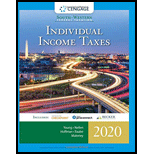
Identify the two rules designed to limit the tax benefits a tax payer may obtain from a tax shelter investment. Explain the manner these rules reduce or defer the recognized tax losses.
Explanation of Solution
The two rules designed to limit the tax benefits a tax payer may obtain from a tax shelter investment are “at-risk provisions” and “passive activity loss rules”.
The at-risk provisions are relevant to individuals and closely held corporations. As per these rules, a taxpayer’s allowable loss from an activity for any taxable year is restricted to the amount the taxpayer has at risk at the end of that taxable year.
The passive activity loss rules are relevant to individuals, estates, trusts, personal service corporations, and closely held C corporations. Usually, the rules offer that losses or expenses due to the passive activities can be allowed only to the amount of income from the entire amount of the taxpayer’s passive activities. On the other hand, closely held C corporations (other than PSCs) may perhaps use passive activity losses to offset active other than the portfolio income.
Under both sets of rules, losses that are disallowed in the present year might be carried forward to future years where they may provide a tax benefit.
Want to see more full solutions like this?
Chapter 11 Solutions
Individual Income Taxes
- What is its degree of operating leverage on these accounting question?arrow_forwardGet correct answer this general accounting questionarrow_forwardInternal controls are the rules and procedures that a company develops and implements. These controls help to maintain the accountability and integrity of the accounting information as well as help to prevent fraud. There are many objectives of a well-designed internal control structure in an organization. These include having a controlled environment, assessing risks, and monitoring. An example of a control that I personally use would be in our register system. Every night, the evening cook/helper counts down the cash register drawer and lets me know how much cash was in the drawer over the amount that we leave in it every night of $125. The next morning, I compare the information from the cash register balance sheet to the computer system to ensure all numbers match up. These numbers are then recorded daily into a monthly spreadsheet that we ensure balances at the end of the month. Respond to ally's postarrow_forward
- Please give me correct answer this financial accounting questionarrow_forwardInternal control in a business organization and the reporting of cash on the balance sheet as well as managing receivables and estimating uncollectible accounts is important. What is internal control, and what are the objectives of a well-designed internal control structure in an organization?arrow_forwardCan you please solve this accounting problem?arrow_forward
 Individual Income TaxesAccountingISBN:9780357109731Author:HoffmanPublisher:CENGAGE LEARNING - CONSIGNMENT
Individual Income TaxesAccountingISBN:9780357109731Author:HoffmanPublisher:CENGAGE LEARNING - CONSIGNMENT





